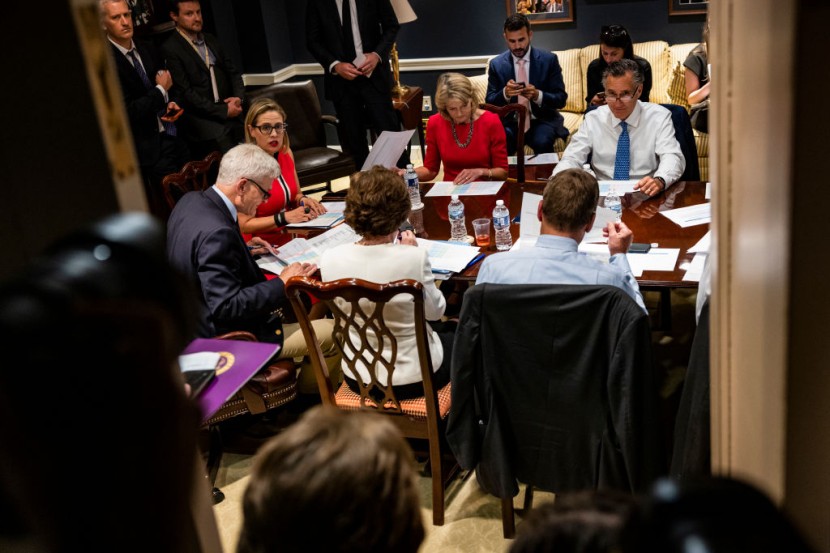
Individuals briefed on the situation said a bipartisan group of senators is exploring an infrastructure deal with $579 billion in new spending as negotiators strive to reach a nearly $1 trillion compromise on President Joe Biden's top priority.
Ten senators have been meeting behind closed doors, with Biden encouraging them to keep working on the project after he withdrew from a Republican-only proposal last week due to disagreements. Senators are informing their colleagues confidentially and have warned that adjustments may be made.
The bipartisan group's agreement is a significant step in the infrastructure plan
Per US News, the senators said in a joint statement, "Our group - consisting of ten Senators, five from each party - has worked in good faith and established a bipartisan agreement on a realistic, compromise framework to update our nation's infrastructure and energy technologies."
Democratic senators informed the president on the emerging strategy, according to the White House, but concerns remain. The President and Congress have been unable to achieve an agreement on his plans for infrastructure spending, with disagreements over the scale of the package of road, highway, and other projects, as well as how to fund them.
Lawmakers believe the group's initial agreement is a significant step forward in developing a plan that can pass in this year's evenly divided Congress, but they also recognize that it may quickly collapse. The cost would be $974 billion over five years, as is customary for highway expenditure, or $1.2 trillion over eight years, as Biden proposes.
The current deal would be larger than the previous Republican-only effort, which included $330 billion in extra spending in a $928 billion package, but it would still fall short of Biden's desire for $1.7 trillion over eight years. The group looks to be having the same difficulties as Biden and Chief Republican negotiator Sen. Shelley Moore Capito in reaching an agreement on how to pay for it.
Bipartisan Senators reaches infrastructure deal without tax hikes
While senators claim to have reached an agreement on the complex question of how to pay for infrastructure, the funding methods may yet split them. To counteract investments, Biden and Democrats have proposed raising the corporate tax rate, but Republicans have stated that they would not restore their 2017 tax cuts. The White House wants to raise the corporate tax rate from 21 percent to at least 25 percent, CNBC reported.
Sen. Jon Tester, a Montana Democrat who has joined the talks, said earlier Thursday that the plan's funding could come from a variety of sources. As Biden pursues an infrastructure measure as his second major legislative effort, the White House has maintained contact with Senate negotiators.
Initially, the president proposed a $2.3 trillion plan, but following conversations with Capito, he reduced his offer to $1.7 trillion. Senator Bill Cassidy, a Louisiana Republican engaged in the negotiations, told reporters that Biden had requested at least $600 billion in increased spending over the baseline previously set by Congress.
Democrats, despite controlling both chambers of Congress, have a difficult road to passing an infrastructure plan. While they may pass a measure in the Senate's equally divided chamber on their own through budget reconciliation, they must enlist the support of all 50 members of their caucus.
Sen. Joe Manchin, D-W.Va., has stated that he wants to pass a measure that has bipartisan support. On his own, he could block a Democratic proposal. Manchin is a member of the negotiating group.
This week, the House Problem Solvers Caucus published its infrastructure plan. The $1.25 trillion would be spent, including $762 billion in additional expenditures. The organization did not specify how the investments would be paid for.
Meanwhile, the House of Representatives has passed a five-year, $547 billion surface transportation spending package, which Democrats might utilize to enact key components of Biden's infrastructure plan. Democratic House Majority Leader Steny Hoyer, D-Md., said on Thursday that Democrats hope to vote on the bill by the end of the month.
Per NYTimes, some Republicans were angry when President Biden halted talks with Capito of West Virginia, this week after she presented a series of modest counter-proposals. Liberal Democrats, are worried about missing out on a chance to pass major policy demands such as a series of climate legislation and tax hikes on wealthy corporations and people. They have pushed their leaders to concentrate on delivering the massive investments that people demanded.
The Biden administration has expressed support for a proposal that included at least $1 trillion in additional funding, as well as the expected continuation of existing programs. However, White House officials have stated that indexing the gas tax or imposing a mileage tax on electric vehicles would violate Biden's vow not to raise taxes on those earning less than $400,000 a year.
The White House staff was informed on the evolving framework by Democrats, and administration officials are anticipated to cooperate with legislators. However, the bipartisan group of senators is part of a larger coalition of moderates who have met privately since Biden assumed office to try to find areas of agreement on a variety of issues. Moderate Democrats, in particular, have been concerned about not skipping the requirement for Republican votes on an infrastructure bill, which has long been considered as ripe for bipartisan cooperation.
Related Article: Biden Infrastructure Plan Talks With Capito End, President Turns to Centrist Senators for Support
@YouTube
© 2026 HNGN, All rights reserved. Do not reproduce without permission.








